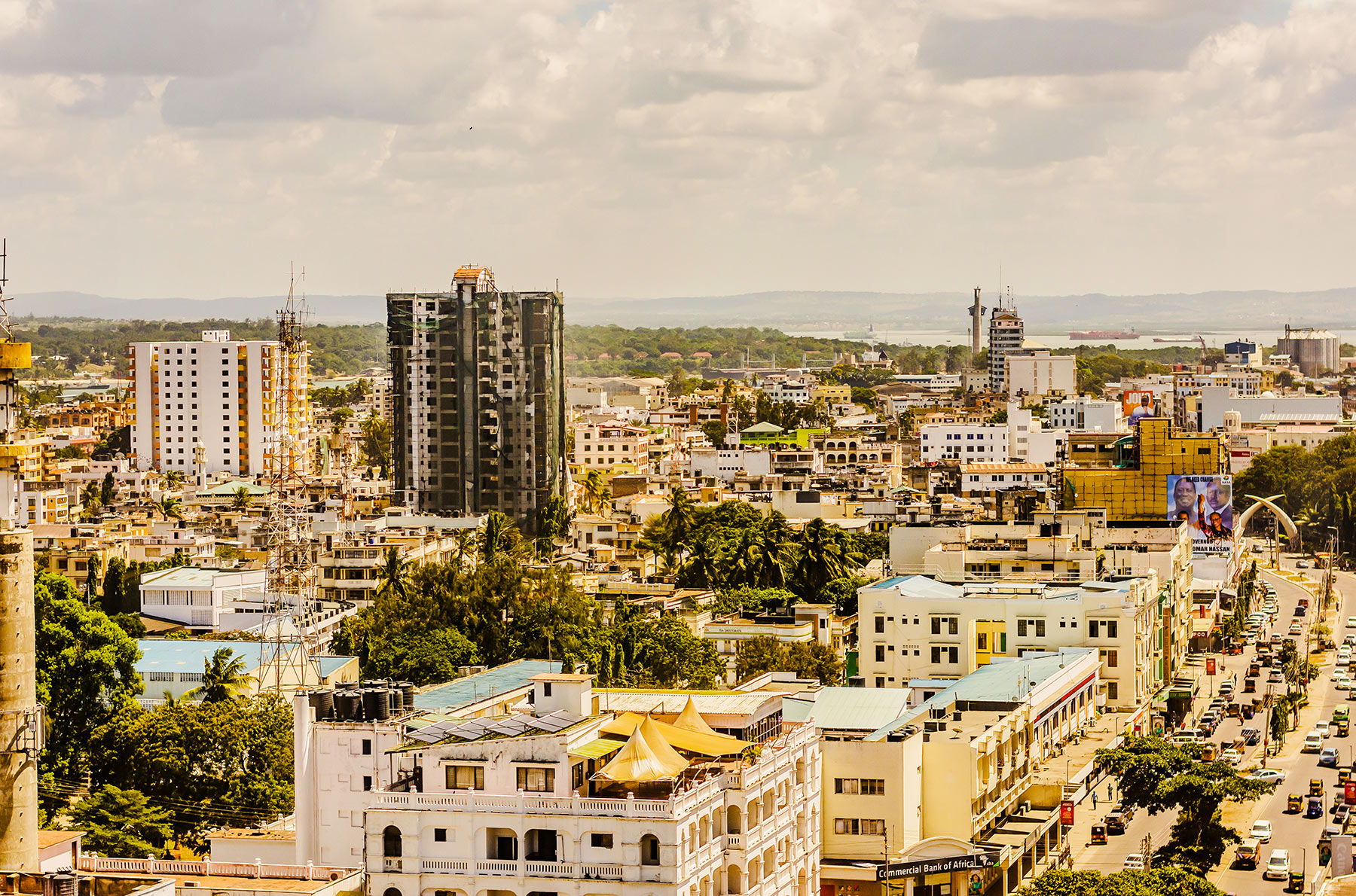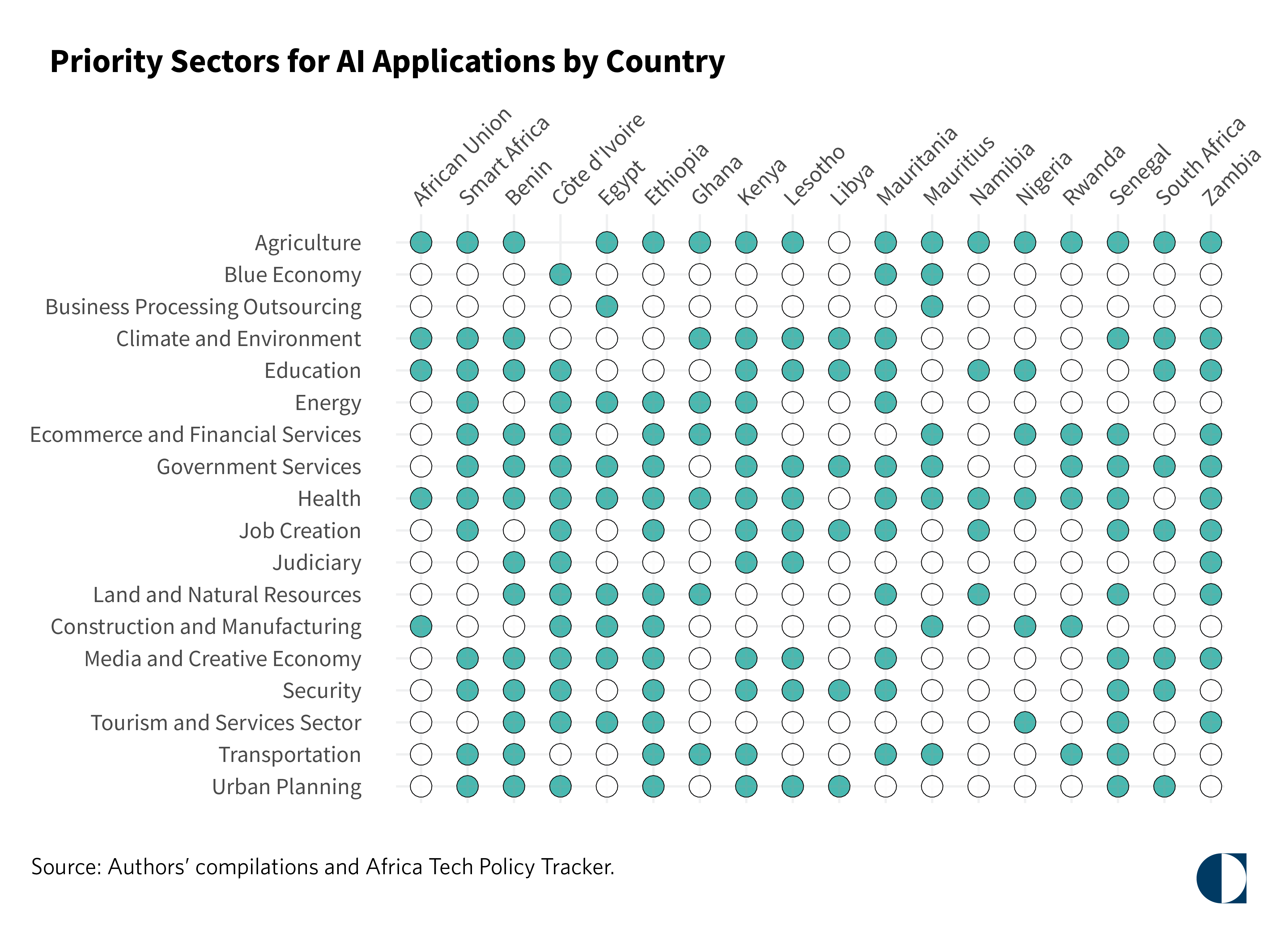
What’s Next for Africa’s AI Future?
AI governance on the continent is maturing, with an increasing number of African countries releasing AI strategies scoped to the domestic, regional, continental, and global levels.
September 2025
Dear friends,
This summer was an exciting and pivotal time for Africa’s digital future—in realms ranging from AI to digital infrastructure, leaders from across the world worked to identify the priorities needed for the continent to meet this moment of technological revolution. To kick off the fall season, we’re taking a special look at Africa’s technology policy landscape and the key questions shaping the AI conversation.
Good policy starts with good questions. Here at the Carnegie Africa Program, we’ve oriented our recent tech work to focus on three:
- “How is Africa’s AI governance evolving?”
- “What digital partnerships can be leveraged to drive AI adoption on the continent?”
- “What are the ground-level infrastructure needs that must be prioritized for Africa’s digital future?"
AI governance on the continent is maturing, with an increasing number of African countries releasing AI strategies scoped to the domestic, regional, continental, and global levels. In a new policy outlook, fellow Jane Munga and research analyst Sylvester Quansah bring in data from the Africa Technology Policy Tracker (AfTech) to contextualize key insights from our recent ministerial roundtable held on the sidelines of the Global AI Summit on Africa in Rwanda. A key finding tracks how Africa’s AI governance is evolving through national strategies—a vital first step to the success of Africa’s digital transformation—and analyzes the strategies to shed light on where African policymakers are hoping to leverage the new technology.
As shown in our Chart of the Month, national strategies tend to highlight key sectors to boost socioeconomic outcomes, and focus primarily on agriculture, government services, and health. While encouraging, governments and stakeholders must move from strategy to implementation, from vision to innovation, and dialogue to impact. Success will depend on developing real AI use cases that serve Africans, especially youth, and position Africa as a global AI leader.
Another evolution is the growing role that AI is playing in Africa’s diplomatic relations. As countries work to navigate an increasingly fraught geopolitical stage, understanding the diplomatic collaboration architecture that can most effectively facilitate digital transformation is an essential component of the policy calculus across the Global South.
In July, the Carnegie Africa Program hosted African and U.S. policymakers, major private sector stakeholders, and civil society leaders to discuss opportunities for U.S.-African partnership and how partners can convert pledged commitments into tangible investments in Africa’s digital future. Developing supportive enabling environments, building well-skilled African populations, and ensuring water-tight digital infrastructure were all cited as entry-points for possible collaborations. The desire for partnership is strong, but questions of political will and public-vs-private investments linger.
Also on the mind of African AI policymakers is the recently launched “America’s AI Action Plan,” the Trump administration's blueprint for how the U.S. should position itself to be the global AI leader. This ambitious document lays out the ways in which this administration envisions global partners and allies fitting into the U.S.-led AI architecture. Later this fall, we’ll have more to come on this document’s implications for the African continent.
Achieving a minimum viable level of infrastructure for AI will require not just increased investment, but a commitment to safeguarding what is already there. This summer, our program joined other Carnegie colleagues for a special episode of “The World Unpacked” podcast to lay out the geopolitical realities surrounding the undersea data infrastructure that enables digital connection in Africa, with recommendations from our recent piece on the continent’s undersea cables.
Throughout the summer, the Africa Program participated in several major international events to advance discussion on all of these threads. On the sidelines of the AI for Good Global Summit in Geneva, we operated as a thought partner with Smart Africa, an alliance of African countries, international organizations and private sector; and engaged in a high-level policy workshop with representatives of African governments to discuss a harmonized model for AI policies. Stay tuned for more on this as we await the launch of the harmonized AI policy template at the upcoming Transform Africa Summit, to be held in Conakry, Guinea in November.
To close out the summer, fellow Jane Munga traveled to Kigali for the Deep Learning Indaba—Africa’s leading AI and machine learning conference. There, she moderated the panel “Shaping Africa’s AI Future,” where she shared insights on national AI strategies gleaned from the African Technology Policy Tracker (AfTech) and led a discussion on connecting policy with tech practice. The session featured recorded remarks from H.E. Ms. Lerato D. Mataboge, African Union Commissioner for Infrastructure and Energy, calling for greater continental collaboration. Jane also spoke at the African Chief of Defense Staff Summit in Abuja, Nigeria, where she shared her analysis of digital partnerships in a panel titled, “Resourcing African Defense: The Role of Public-Private Partnership.”
Major discussions around technology, trade, and critical minerals have been intersecting since our last newsletter. At the World Trade Organization’s Public Forum, nonresident scholar Kholofelo Kugler joined senior officials from the Organization for Economic Co-operation and Development to discuss global trade in a digital age, drawing analysis from her article on Africa at the WTO. In Ghana, nonresident scholar Nicolas Lippolis spoke at the Future of Energy Conference on the role of national oil companies in financing green infrastructure. Finally, our program released a paper co-authored by former nonresident scholar Folashadé Soulé on the role that the Atlantic Lithium project might play in facilitating Ghana’s value-chain ambitions and the knock-on effects for its local communities.
Finally, we want to share that after more than four years as the founding director of the Africa Program, Dr. Zainab Usman has decided to move on to her next professional chapter. We are grateful to Zainab for her model of scholarly excellence, and we will build on her work going forward. We wish her all the best.
As we look ahead, the Carnegie Africa Program is committed to keeping the momentum going—so don’t touch that dial. As the world anticipates major international fora this fall, and the United States continues to convey its vision for a new global policy landscape, we will be there to deliver rigorous analysis on the issues shaping the African continent. Stay informed by subscribing to our newsletter, and by following us on LinkedIn and X at @AfricaCarnegie.
Sincerely,
The Carnegie Africa Program
Chart of the Month
National strategies tend to highlight key sectors to boost socioeconomic outcomes, and focus primarily on agriculture, government services, and health. While encouraging, governments and stakeholders must move from strategy to implementation, vision to innovation, and dialogue to impact. Success will depend on developing real AI use cases that serve Africans, especially youth, and position Africa as a global AI leader.

Features
Can Critical Mineral Deals Benefit Local Communities? Insights From Ghana’s Lithium Project
Ghana’s ongoing experience in trying to capture and domesticate segments of the lithium value chain offers valuable insights regarding potential benefits to local communities.
by Folashadé Soulé, Mawuenyega Makafui Butu, and Emmanuel Amoah-Darkwah
These Undersea Cables are the Key to Africa's Future
A network of undersea cables connects the entire world and holds the internet together. In the last few decades, these submarine cables have also allowed millions of Africans to go online.
By Jane Munga
DR Congo-Rwanda Peace Deal: What Next?
Brokered by the US and backed by Qatar, the long-awaited peace deal between the Democratic Republic of Congo and Rwanda is being hailed as historic. Hopes are high for an end to decades of war, but analysts are still pessimistic.
By Christian-Géraud Neema, Deutsche Welle News
How a U.S.-Africa Business Summit Could Launch a New Era of U.S.-Africa Relations
By shifting away from traditional aid delivery systems, a U.S.-Africa business summit could launch a new era of U.S.-Africa relations in a way likely to yield growth and shared prosperity.
By Ramsey Day
How African Countries Are Responding to the New U.S. Reciprocal Tariffs
As African countries face different impacts from the tariffs and offer different responses, a cohesive trade strategy will be necessary to support individual economies and expand the continent-wide integration project.
By Kholofelo Kugler and Tani Washington
Developments on Our Radar
US‑Africa Week Ahead: Defense bill, AGOA lobbying and Trump envoys move forward [Africa Report]
Ivory Coast Signs $322M U.S. Energy Compact [Energy Capital & Power]
West Africans Deported by the U.S. Sue Ghana for Rights Violations [New York Times]
African leaders seek to offer climate model after US pullback [Reuters]
Ethiopia inaugurates Africa’s biggest dam amid regional tensions [NPR]
What the 80th UN General Assembly means for Africa [Brookings]
Professional Development Opportunities
Council on Foreign Relations International Affairs Fellowship [application]
Congressional Technology & Policy Fellowship [application]
2026-2027 Princeton in Africa Fellowships [application]
2026 – 2028 UNDP Graduate Program [application]
2025 Mo Ibrahim Foundation Fellowship [application]
Carnegie does not take institutional positions on public policy issues; the views represented herein are those of the author(s) and do not necessarily reflect the views of Carnegie, its staff, or its trustees.